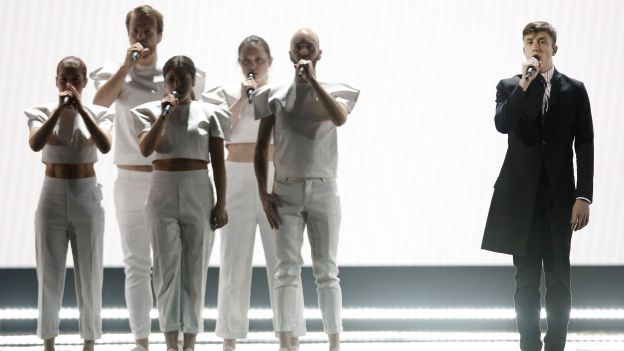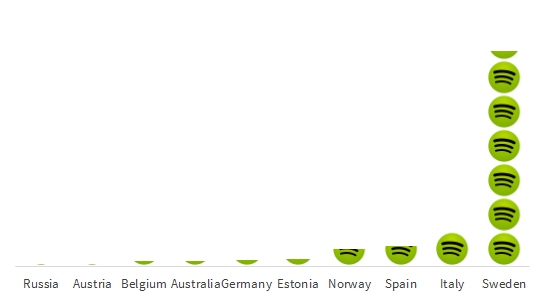
Predicting the winner of Eurovision 2015 with social media

Good evening, Vienna – this is MintTwist calling! The Eurovision Song Contest 2015 is almost upon us!
And as Europe turns its gaze to Austria, along with some of antipodean cousins for the 60th anniversary, join us as we take our annual look into seeing if social media can predict the Eurovision Song Contest.
We’ve had some great success and accuracy over the years that we’ve been doing this but this year might be too close to call.
 Sweden completely dominates Spotify – it’s got more plays than the rest of the entrants combined. It’s pretty clear that Heroes has struck a massive chord with music fans.
In fact, Heroes dwarves Conchita Wurst's combined Rise Like a Phoenix's plays on Spotify (approximately 6 million) although this data might be skewed by the platform's massive popularity in Scandinavia.
It’s also worth noting that Heroes won Melodifestivalen (Sweden’s very own televised contest to pick a Eurovision entrant) in magnificent style. It won with 288 points – a record under Melodifestivalen’s current points system and a record marginal of 149 points between it and the runner up.
Sanna Nielsen’s Undo came third last year despite only winning Melodifestivalen 2014 with a marginal of 2 points. Loreen’s Euphoria, which received the highest number of 12 points ever at a contest, won Melodifestivalen 2012 won with 268 points. Could Heroes’ runaway success at Melodifestivalen be a sign of triumph in Vienna? Many are saying yes and it is currently the bookies’ favourite to win the show.
Sweden completely dominates Spotify – it’s got more plays than the rest of the entrants combined. It’s pretty clear that Heroes has struck a massive chord with music fans.
In fact, Heroes dwarves Conchita Wurst's combined Rise Like a Phoenix's plays on Spotify (approximately 6 million) although this data might be skewed by the platform's massive popularity in Scandinavia.
It’s also worth noting that Heroes won Melodifestivalen (Sweden’s very own televised contest to pick a Eurovision entrant) in magnificent style. It won with 288 points – a record under Melodifestivalen’s current points system and a record marginal of 149 points between it and the runner up.
Sanna Nielsen’s Undo came third last year despite only winning Melodifestivalen 2014 with a marginal of 2 points. Loreen’s Euphoria, which received the highest number of 12 points ever at a contest, won Melodifestivalen 2012 won with 268 points. Could Heroes’ runaway success at Melodifestivalen be a sign of triumph in Vienna? Many are saying yes and it is currently the bookies’ favourite to win the show.
 Russia massively dominates YouTube viewing figures, with Eurovision powerhouse Azerbaijan, coming a close second.
Russia is likely to hit 7 million views before the competition – unprecedented since we started our analysis in 2012. To put this into context, 2013’s winning performance had only 1.8 million views when we predicted Emmelie de Forest would win the ESC 2013.
Russia’s power ballad promoting peace from Polina Gagarina is predicted to do well (currently 2nd in the Eurovision winner odds), and if Polina can continue to ride the YouTube wave of popularity then she should do fantastically.
Looking at the views for the rehearsals, Russia, Estonia and Sweden are proving popular and we have seen a massive increase in production values in recent years which can have a huge impact on scores – especially thanks to the semi-finals giving contestants a chance to win over new fans.
Russia massively dominates YouTube viewing figures, with Eurovision powerhouse Azerbaijan, coming a close second.
Russia is likely to hit 7 million views before the competition – unprecedented since we started our analysis in 2012. To put this into context, 2013’s winning performance had only 1.8 million views when we predicted Emmelie de Forest would win the ESC 2013.
Russia’s power ballad promoting peace from Polina Gagarina is predicted to do well (currently 2nd in the Eurovision winner odds), and if Polina can continue to ride the YouTube wave of popularity then she should do fantastically.
Looking at the views for the rehearsals, Russia, Estonia and Sweden are proving popular and we have seen a massive increase in production values in recent years which can have a huge impact on scores – especially thanks to the semi-finals giving contestants a chance to win over new fans.
 When we look at the growth in likes on YouTube, Sweden is far out in the lead – with a 287% growth in YouTube likes. Currently Mans Zemerlew lags behind the competition in terms of actual views (it is worth noting his video was uploaded to the Eurovision Song Contest YouTube channel rather late compared to the other entrants and that the upload to the Warner Music Sweden channel has significantly more views but as a rule we only use the official video uploaded to the official Eurovision Song Contest YouTube channel).
When we look at the growth in likes on YouTube, Sweden is far out in the lead – with a 287% growth in YouTube likes. Currently Mans Zemerlew lags behind the competition in terms of actual views (it is worth noting his video was uploaded to the Eurovision Song Contest YouTube channel rather late compared to the other entrants and that the upload to the Warner Music Sweden channel has significantly more views but as a rule we only use the official video uploaded to the official Eurovision Song Contest YouTube channel).
 If we look at how YouTube traffic has grown we have seen Russia continue to dominate the scene with Azerbaijan and Albania completing the top three. The UK fares well here but the UK is bad at converting YouTube popularity into votes; the UK also has one of the worst dislike scores.
If we look at how YouTube traffic has grown we have seen Russia continue to dominate the scene with Azerbaijan and Albania completing the top three. The UK fares well here but the UK is bad at converting YouTube popularity into votes; the UK also has one of the worst dislike scores.
 Belgium's Loic Nottet has done a fantastic job at growing his Twitter following - significantly more than the competition. Four of the competition favourites, Italy, Seden, Australia and Estonia have also done well.
Twitter is often the weakest social platform for the contest – with many contestants languishing around the sub-3,000 follower mark. This is surprisingly low considering the ESC have an official app (which allows you to vote in some countries) and the relationship between Twitter and TV viewership is has grown exponentially.
Belgium's Loic Nottet has done a fantastic job at growing his Twitter following - significantly more than the competition. Four of the competition favourites, Italy, Seden, Australia and Estonia have also done well.
Twitter is often the weakest social platform for the contest – with many contestants languishing around the sub-3,000 follower mark. This is surprisingly low considering the ESC have an official app (which allows you to vote in some countries) and the relationship between Twitter and TV viewership is has grown exponentially.
 This Norway, Latvia and Israel have grown their Facebook following the most, by 258%, 245% and 139% respectively.
It’s worth noting that the numbers are still comparatively smaller compared to some of the established acts that are being sent. For example, Italy’s 900,000+ followers dwarves everyone else but they have grown their account at a slower pace.
This Norway, Latvia and Israel have grown their Facebook following the most, by 258%, 245% and 139% respectively.
It’s worth noting that the numbers are still comparatively smaller compared to some of the established acts that are being sent. For example, Italy’s 900,000+ followers dwarves everyone else but they have grown their account at a slower pace.
So there we have it! Congratulations to Sweden who is our predicted winner of the Eurovision Song Contest 2015!
Sweden has long been heralded as the competition's favourite but we have seen favourites not do so well previously and the semi-finals can really shape things up. Last year's the Netherland's Common Linnets massively benefited from the semi-final and far exceeded early predictions and to come in second, beating hot favourite Sweden into third place.
It’s shaping up to be a two horse race between Italy and Sweden and it’s almost too close to call. The points difference between the top entries could change so easily and of course there are a wide number of outliers that play a part in success:
 Currently Sweden continues to ride high on being the competiton's favourites but we have seen late surges in support for Belgium and Russia. Estonia continues to do well but Italy - once considered to be a winner - has started to lose traction.
Currently Sweden continues to ride high on being the competiton's favourites but we have seen late surges in support for Belgium and Russia. Estonia continues to do well but Italy - once considered to be a winner - has started to lose traction.
 Sweden, the hot favourite on everyone’s lips, does an okay job at social media – Mans has been growing his social media following well, but doesn’t have the same reach has many of the bigger stars.
Instead, Heroes has really picked up momentum and completely dominating the rest of the entries on Spotify and quickly growing in YouTube plays.
Sweden, the hot favourite on everyone’s lips, does an okay job at social media – Mans has been growing his social media following well, but doesn’t have the same reach has many of the bigger stars.
Instead, Heroes has really picked up momentum and completely dominating the rest of the entries on Spotify and quickly growing in YouTube plays.
Belgium's Loic Nottet has seen his odds slash in recent days - and we have predicted him to do extremely well in the Eurovision final. He doesn't score massively but he has managed to gain signifciant traction - growing his YouTube plays by 209% and has grown his Twitter following by 181% - far more than any other contestant.
 Estonia has been a quiet favourite – consistently ranking high in polls but not quite high enough to make it a three horse race. Estonia ranks well across the majority of metrics and will most likely be a solid score winner, but maybe not a 10 or 12 point runaway success.
Estonia has been a quiet favourite – consistently ranking high in polls but not quite high enough to make it a three horse race. Estonia ranks well across the majority of metrics and will most likely be a solid score winner, but maybe not a 10 or 12 point runaway success.
 Not many people had predicted a Russian winner (or even a top 5 finish) before the start of this week but Polina has been the runaway success of the competition on YouTube - her plays completely dwarf the competition.
Her odds were slashed following her semi-final performance and she is currently one of the hot favourites to win the competition. Betting on Polina to win wouldn't be a silly decision at all.
Not many people had predicted a Russian winner (or even a top 5 finish) before the start of this week but Polina has been the runaway success of the competition on YouTube - her plays completely dwarf the competition.
Her odds were slashed following her semi-final performance and she is currently one of the hot favourites to win the competition. Betting on Polina to win wouldn't be a silly decision at all.
 Last year, there were three entrants that had over 1 million views when we conducted our analysis: Armenia, Austria and Azerbaijan but there were far more entrants with a larger view count – a handful were around 800,000-900,000.
In 2015 we have already seen a massive upward trend since 2014. There are 17 (yes - count them!) entries with more than a million views in YouTube. In fact, this year we have reached massive views for an elite three: Russia and Azerbaijan both have more than 5 million views whilst Albania has already reached 4 million and we’ve not even reached the semi-finals. Polina Gagarina may reach 7 million views on YouTube before the start of the final such has been her success on the channel.
In fact, Russia and Azerbaijan's views alone eclipse the total number of views for all 26 finalists of the Eurovision Song Contest 2013 when we conducted our research.
Last year, there were three entrants that had over 1 million views when we conducted our analysis: Armenia, Austria and Azerbaijan but there were far more entrants with a larger view count – a handful were around 800,000-900,000.
In 2015 we have already seen a massive upward trend since 2014. There are 17 (yes - count them!) entries with more than a million views in YouTube. In fact, this year we have reached massive views for an elite three: Russia and Azerbaijan both have more than 5 million views whilst Albania has already reached 4 million and we’ve not even reached the semi-finals. Polina Gagarina may reach 7 million views on YouTube before the start of the final such has been her success on the channel.
In fact, Russia and Azerbaijan's views alone eclipse the total number of views for all 26 finalists of the Eurovision Song Contest 2013 when we conducted our research.
 However, even more importantly is having an engaging stage production. Gone are the days of standing still (with or without a band) and just singing well.
In a world where selfie sticks are getting banned left, right and centre, and visual media is just a second away in the palm of your hand, millennials and Generation Z are bombarded by imagery and video in a way that previous generations never were.
We have seen the most recent winners all putting on creative stage show extravaganzas – whether it was the stark silhouettes employed by Loreen’s performance of Euphoria, or last year’s winner Conchita Wurst’s emotive flame-filled stage for Rise Like a Phoenix, clearly Eurovision fans want and expect something more.
However, even more importantly is having an engaging stage production. Gone are the days of standing still (with or without a band) and just singing well.
In a world where selfie sticks are getting banned left, right and centre, and visual media is just a second away in the palm of your hand, millennials and Generation Z are bombarded by imagery and video in a way that previous generations never were.
We have seen the most recent winners all putting on creative stage show extravaganzas – whether it was the stark silhouettes employed by Loreen’s performance of Euphoria, or last year’s winner Conchita Wurst’s emotive flame-filled stage for Rise Like a Phoenix, clearly Eurovision fans want and expect something more.
 For 2015, we’ve already seen some creative use of the stage in the rehearsals and following on from 2014’s LED wall, 2015 will feature 1,288 individual LED pillars wrapping a large LED wall – expect some fantastical visuals to go with the songs for the strongest performances.
For 2015, we’ve already seen some creative use of the stage in the rehearsals and following on from 2014’s LED wall, 2015 will feature 1,288 individual LED pillars wrapping a large LED wall – expect some fantastical visuals to go with the songs for the strongest performances.
 It's great to see Eurovision embracing social media and we can only expect this interaction to grow.
It's great to see Eurovision embracing social media and we can only expect this interaction to grow.
Content
- Spotify plays
- YouTube views
- YouTube likes
- Twitter followers
- Facebook likes
- Final predicted winner
- Top 5 prediction breakdown
- Emerging trends in the Eurovision Song Contest
Algorithm for social media predictions
As usual, we have employed an algorithm to make the social media predictions – combining multiple social media metrics to get a final score. Some of the metrics include:- Facebook likes
- Twitter followers
- YouTube views
- Social media mentions
12 points go to…
The different entrants get scored using the Eurovision Song Contest’s points systems – 12 points for 1st, 10 points for 2nd and then 8, 7, 6 and so on for the rest of the top 10. So without further ado, join us as we find out who social media predicts will be the Eurovision Song Contest 2015’s winner!Eurovision Song Contest 2015 – Spotify plays
 Sweden completely dominates Spotify – it’s got more plays than the rest of the entrants combined. It’s pretty clear that Heroes has struck a massive chord with music fans.
In fact, Heroes dwarves Conchita Wurst's combined Rise Like a Phoenix's plays on Spotify (approximately 6 million) although this data might be skewed by the platform's massive popularity in Scandinavia.
It’s also worth noting that Heroes won Melodifestivalen (Sweden’s very own televised contest to pick a Eurovision entrant) in magnificent style. It won with 288 points – a record under Melodifestivalen’s current points system and a record marginal of 149 points between it and the runner up.
Sanna Nielsen’s Undo came third last year despite only winning Melodifestivalen 2014 with a marginal of 2 points. Loreen’s Euphoria, which received the highest number of 12 points ever at a contest, won Melodifestivalen 2012 won with 268 points. Could Heroes’ runaway success at Melodifestivalen be a sign of triumph in Vienna? Many are saying yes and it is currently the bookies’ favourite to win the show.
Sweden completely dominates Spotify – it’s got more plays than the rest of the entrants combined. It’s pretty clear that Heroes has struck a massive chord with music fans.
In fact, Heroes dwarves Conchita Wurst's combined Rise Like a Phoenix's plays on Spotify (approximately 6 million) although this data might be skewed by the platform's massive popularity in Scandinavia.
It’s also worth noting that Heroes won Melodifestivalen (Sweden’s very own televised contest to pick a Eurovision entrant) in magnificent style. It won with 288 points – a record under Melodifestivalen’s current points system and a record marginal of 149 points between it and the runner up.
Sanna Nielsen’s Undo came third last year despite only winning Melodifestivalen 2014 with a marginal of 2 points. Loreen’s Euphoria, which received the highest number of 12 points ever at a contest, won Melodifestivalen 2012 won with 268 points. Could Heroes’ runaway success at Melodifestivalen be a sign of triumph in Vienna? Many are saying yes and it is currently the bookies’ favourite to win the show.
Eurovision Song Contest 2015 – YouTube views
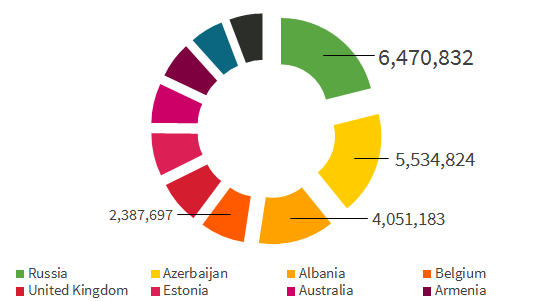 Russia massively dominates YouTube viewing figures, with Eurovision powerhouse Azerbaijan, coming a close second.
Russia is likely to hit 7 million views before the competition – unprecedented since we started our analysis in 2012. To put this into context, 2013’s winning performance had only 1.8 million views when we predicted Emmelie de Forest would win the ESC 2013.
Russia’s power ballad promoting peace from Polina Gagarina is predicted to do well (currently 2nd in the Eurovision winner odds), and if Polina can continue to ride the YouTube wave of popularity then she should do fantastically.
Looking at the views for the rehearsals, Russia, Estonia and Sweden are proving popular and we have seen a massive increase in production values in recent years which can have a huge impact on scores – especially thanks to the semi-finals giving contestants a chance to win over new fans.
Russia massively dominates YouTube viewing figures, with Eurovision powerhouse Azerbaijan, coming a close second.
Russia is likely to hit 7 million views before the competition – unprecedented since we started our analysis in 2012. To put this into context, 2013’s winning performance had only 1.8 million views when we predicted Emmelie de Forest would win the ESC 2013.
Russia’s power ballad promoting peace from Polina Gagarina is predicted to do well (currently 2nd in the Eurovision winner odds), and if Polina can continue to ride the YouTube wave of popularity then she should do fantastically.
Looking at the views for the rehearsals, Russia, Estonia and Sweden are proving popular and we have seen a massive increase in production values in recent years which can have a huge impact on scores – especially thanks to the semi-finals giving contestants a chance to win over new fans.
Eurovision Song Contest 2015 – YouTube likes
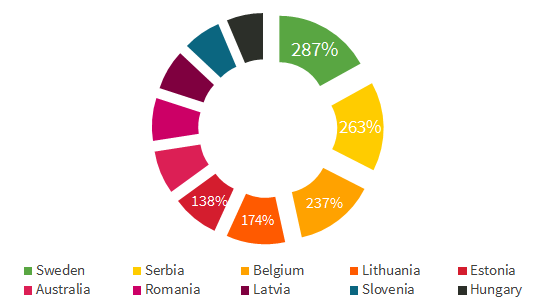 When we look at the growth in likes on YouTube, Sweden is far out in the lead – with a 287% growth in YouTube likes. Currently Mans Zemerlew lags behind the competition in terms of actual views (it is worth noting his video was uploaded to the Eurovision Song Contest YouTube channel rather late compared to the other entrants and that the upload to the Warner Music Sweden channel has significantly more views but as a rule we only use the official video uploaded to the official Eurovision Song Contest YouTube channel).
When we look at the growth in likes on YouTube, Sweden is far out in the lead – with a 287% growth in YouTube likes. Currently Mans Zemerlew lags behind the competition in terms of actual views (it is worth noting his video was uploaded to the Eurovision Song Contest YouTube channel rather late compared to the other entrants and that the upload to the Warner Music Sweden channel has significantly more views but as a rule we only use the official video uploaded to the official Eurovision Song Contest YouTube channel).
Eurovision Song Contest 2015 – YouTube views
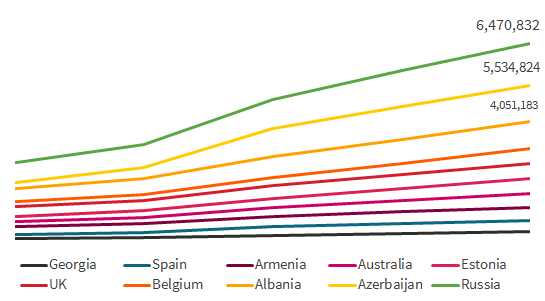 If we look at how YouTube traffic has grown we have seen Russia continue to dominate the scene with Azerbaijan and Albania completing the top three. The UK fares well here but the UK is bad at converting YouTube popularity into votes; the UK also has one of the worst dislike scores.
If we look at how YouTube traffic has grown we have seen Russia continue to dominate the scene with Azerbaijan and Albania completing the top three. The UK fares well here but the UK is bad at converting YouTube popularity into votes; the UK also has one of the worst dislike scores.
Eurovision Song Contest 2015 – Twitter followers
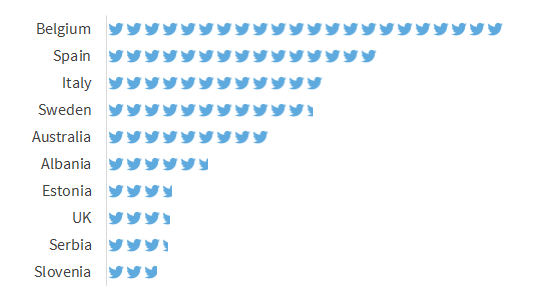 Belgium's Loic Nottet has done a fantastic job at growing his Twitter following - significantly more than the competition. Four of the competition favourites, Italy, Seden, Australia and Estonia have also done well.
Twitter is often the weakest social platform for the contest – with many contestants languishing around the sub-3,000 follower mark. This is surprisingly low considering the ESC have an official app (which allows you to vote in some countries) and the relationship between Twitter and TV viewership is has grown exponentially.
Belgium's Loic Nottet has done a fantastic job at growing his Twitter following - significantly more than the competition. Four of the competition favourites, Italy, Seden, Australia and Estonia have also done well.
Twitter is often the weakest social platform for the contest – with many contestants languishing around the sub-3,000 follower mark. This is surprisingly low considering the ESC have an official app (which allows you to vote in some countries) and the relationship between Twitter and TV viewership is has grown exponentially.
Eurovision Song Contest 2015 - Facebook likes
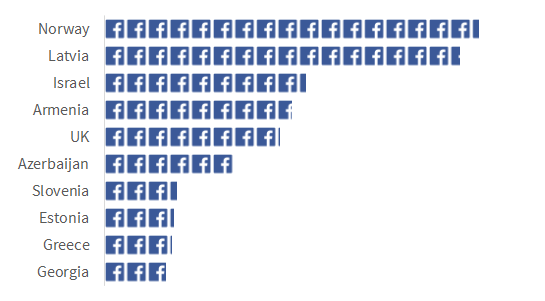 This Norway, Latvia and Israel have grown their Facebook following the most, by 258%, 245% and 139% respectively.
It’s worth noting that the numbers are still comparatively smaller compared to some of the established acts that are being sent. For example, Italy’s 900,000+ followers dwarves everyone else but they have grown their account at a slower pace.
This Norway, Latvia and Israel have grown their Facebook following the most, by 258%, 245% and 139% respectively.
It’s worth noting that the numbers are still comparatively smaller compared to some of the established acts that are being sent. For example, Italy’s 900,000+ followers dwarves everyone else but they have grown their account at a slower pace.
Final predicted winner
After calculating the winner using our social media predictions algorithm we have come up with the following top 10:| Sweden | Mans Zelmerlow | Heroes | 73 points |
|---|---|---|---|
| Belgium | Loic Nottet | Rhythm Inside | 65 points |
| Estonia | Elina Born & Stig Rasta | Goodbye to Yesterday | 58 points |
| Russian | Polina Gagarina | A Million Voices | 55.5 points |
| Italy | Il Volo | Grande amore | 48 points |
| Azerbaijan | Elnur Huseynov | Hour of the Wolf | 44 points |
| Australia | Guy Sebastian | Tonight Again | 40 points |
| Spain | Edurne | Amanecer | 36.5 points |
| Norway | Morland & Debrah Scarlett | A Monster Like Me | 34.5 points |
| Albania | Elhaida Dani | I'm Alive | 33 points |
- Draw of performance (aside from Conchita Wurst and Ruslana winning from being drawn 11th and 10th respectively, in the last 10 years all other winners have performed during the second half of the show)
- Language (Serbia’s Marija Serifovic won in 2007 with Molitva and Ruslana won for Ukraine in a song in English and Ukrainian but all other winning songs have been song in English over the last decade. The last Italian language song to win was Toto Cutugno’s Insieme: 1992 in 1990)
- Stage performance (this is a massive part of Eurovision now and the arena’s place a lot of emphasis on the show; a good song with poor staging can very easily get overlooked by an okay song with unforgettable stage production)
- The semi-finals have become massively popular in recent years, giving contestants a chance to wow an already invested audience with their performance mere days before the actual contest. Chances are if you’re going to vote in a semi-final, you’ll vote for the same entrant in the final
- Block voting - expect neighbouring countries to vote for each other consistently but the re-introduction of the jury system makes it slightly more difficult to predict votes
- It’s live! Anything can happen on the night – someone might fall over or forget their words
Top 5 prediction breakdown
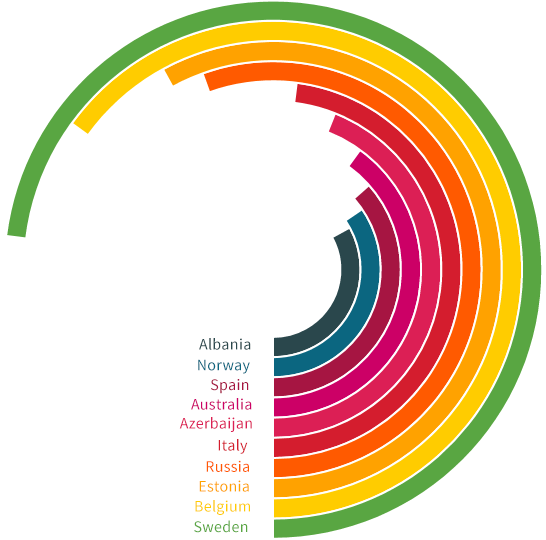 Currently Sweden continues to ride high on being the competiton's favourites but we have seen late surges in support for Belgium and Russia. Estonia continues to do well but Italy - once considered to be a winner - has started to lose traction.
Currently Sweden continues to ride high on being the competiton's favourites but we have seen late surges in support for Belgium and Russia. Estonia continues to do well but Italy - once considered to be a winner - has started to lose traction.
1st - Mans Zelmerlow - Sweden
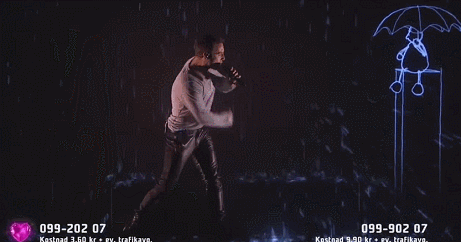 Sweden, the hot favourite on everyone’s lips, does an okay job at social media – Mans has been growing his social media following well, but doesn’t have the same reach has many of the bigger stars.
Instead, Heroes has really picked up momentum and completely dominating the rest of the entries on Spotify and quickly growing in YouTube plays.
Sweden, the hot favourite on everyone’s lips, does an okay job at social media – Mans has been growing his social media following well, but doesn’t have the same reach has many of the bigger stars.
Instead, Heroes has really picked up momentum and completely dominating the rest of the entries on Spotify and quickly growing in YouTube plays.
2nd - Loic Nottet - Belgium
3rd - Elina Born & Stig Rasta - Estonia
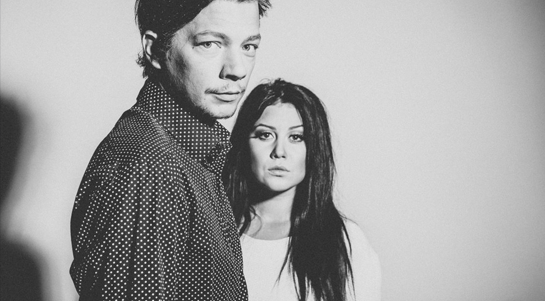 Estonia has been a quiet favourite – consistently ranking high in polls but not quite high enough to make it a three horse race. Estonia ranks well across the majority of metrics and will most likely be a solid score winner, but maybe not a 10 or 12 point runaway success.
Estonia has been a quiet favourite – consistently ranking high in polls but not quite high enough to make it a three horse race. Estonia ranks well across the majority of metrics and will most likely be a solid score winner, but maybe not a 10 or 12 point runaway success.
4th - Polina Gagarina - Russia
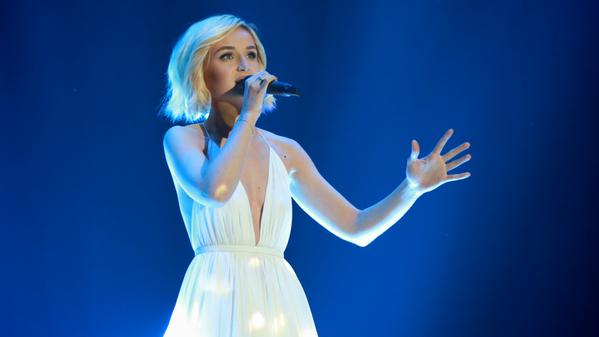 Not many people had predicted a Russian winner (or even a top 5 finish) before the start of this week but Polina has been the runaway success of the competition on YouTube - her plays completely dwarf the competition.
Her odds were slashed following her semi-final performance and she is currently one of the hot favourites to win the competition. Betting on Polina to win wouldn't be a silly decision at all.
Not many people had predicted a Russian winner (or even a top 5 finish) before the start of this week but Polina has been the runaway success of the competition on YouTube - her plays completely dwarf the competition.
Her odds were slashed following her semi-final performance and she is currently one of the hot favourites to win the competition. Betting on Polina to win wouldn't be a silly decision at all.
5th - Il Volo - Italy
Coming in fifth is Italy’s Il Volo. They score big on Facebook and Twitter being an established act but Italy have sent established acts before and we have not seen that translate into Eurovision success.
Importantly they pick up good scores from YouTube likes and big scores from Spotify plays – helping them secure a high finish but as the competition enters its final hours, they have started to lose momentum. Of course on the night they will probably do extremely well and are still considered one of the hot favourites to win by the bookies.
Emerging social media trends in the Eurovision Song Contest
This is the fourth year we’ve made our social media predictions for Eurovision, and we’ve started to see some interesting trends.YouTube grows significantly
When Emmelie de Forest was crowned Eurovision winner in 2013, she had by far the most YouTube views and likes than any other contest. At the time of our analysis, she had 1.8 million views; the entrant with the second highest number of YouTube views was Ukraine’s Zlata Ognevich (who came third).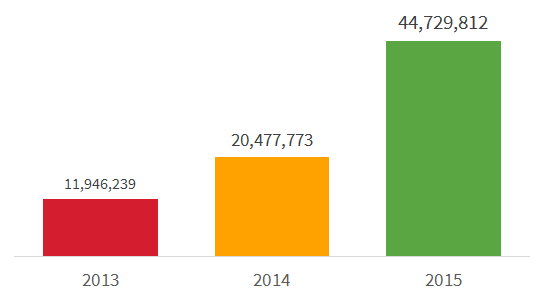 Last year, there were three entrants that had over 1 million views when we conducted our analysis: Armenia, Austria and Azerbaijan but there were far more entrants with a larger view count – a handful were around 800,000-900,000.
In 2015 we have already seen a massive upward trend since 2014. There are 17 (yes - count them!) entries with more than a million views in YouTube. In fact, this year we have reached massive views for an elite three: Russia and Azerbaijan both have more than 5 million views whilst Albania has already reached 4 million and we’ve not even reached the semi-finals. Polina Gagarina may reach 7 million views on YouTube before the start of the final such has been her success on the channel.
In fact, Russia and Azerbaijan's views alone eclipse the total number of views for all 26 finalists of the Eurovision Song Contest 2013 when we conducted our research.
Last year, there were three entrants that had over 1 million views when we conducted our analysis: Armenia, Austria and Azerbaijan but there were far more entrants with a larger view count – a handful were around 800,000-900,000.
In 2015 we have already seen a massive upward trend since 2014. There are 17 (yes - count them!) entries with more than a million views in YouTube. In fact, this year we have reached massive views for an elite three: Russia and Azerbaijan both have more than 5 million views whilst Albania has already reached 4 million and we’ve not even reached the semi-finals. Polina Gagarina may reach 7 million views on YouTube before the start of the final such has been her success on the channel.
In fact, Russia and Azerbaijan's views alone eclipse the total number of views for all 26 finalists of the Eurovision Song Contest 2013 when we conducted our research.
Spotify gives entrants a chance to promote overseas
Promoting across Europe is an integral part of Eurovision success – live shows, TV appearances or radio interviews are an effective way of introducing an entrant to the voting masses. But visiting all voting members (including Australia this year) would be a bit much. Instead, releasing your song on Spotify (or Deezer, or whichever music streaming service you prefer), is a great way to reach every corner of the ESC voting public. This year, Sweden, Italy, Spain and Norway have seen great Spotify plays – far more than the rest of the competition. There's then quite a large gulf between this songs and the rest with the majority of finalists picking up 150,000 plays on average. It will be interesting to see how this plays out – it is the first time we are including Spotify data in our algorithm. Not all countries will have a high number of Spotify subscriptions so some of this data may be skewed but it is looking to be a fairly good barometer of popularity.Performance is increasingly important
One of the most difficult aspects of predicting the ESC winner with social media is that it all boils down to the evening’s performance. Completely fail your performance and you could see those points all but dry up. However, even more importantly is having an engaging stage production. Gone are the days of standing still (with or without a band) and just singing well.
In a world where selfie sticks are getting banned left, right and centre, and visual media is just a second away in the palm of your hand, millennials and Generation Z are bombarded by imagery and video in a way that previous generations never were.
We have seen the most recent winners all putting on creative stage show extravaganzas – whether it was the stark silhouettes employed by Loreen’s performance of Euphoria, or last year’s winner Conchita Wurst’s emotive flame-filled stage for Rise Like a Phoenix, clearly Eurovision fans want and expect something more.
However, even more importantly is having an engaging stage production. Gone are the days of standing still (with or without a band) and just singing well.
In a world where selfie sticks are getting banned left, right and centre, and visual media is just a second away in the palm of your hand, millennials and Generation Z are bombarded by imagery and video in a way that previous generations never were.
We have seen the most recent winners all putting on creative stage show extravaganzas – whether it was the stark silhouettes employed by Loreen’s performance of Euphoria, or last year’s winner Conchita Wurst’s emotive flame-filled stage for Rise Like a Phoenix, clearly Eurovision fans want and expect something more.
 For 2015, we’ve already seen some creative use of the stage in the rehearsals and following on from 2014’s LED wall, 2015 will feature 1,288 individual LED pillars wrapping a large LED wall – expect some fantastical visuals to go with the songs for the strongest performances.
For 2015, we’ve already seen some creative use of the stage in the rehearsals and following on from 2014’s LED wall, 2015 will feature 1,288 individual LED pillars wrapping a large LED wall – expect some fantastical visuals to go with the songs for the strongest performances.
Emerging social media activity
One thing that has consistently been a little lacking is the slow uptake in social media platforms such as Facebook and Twitter. Some contestants still don’t seem to have a Twitter profile or a Facebook page which is almost unbelievable considering just how popular Twitter is with music fans. 7 out of the top 10 most followed Twitter accounts belong to popstars with Katy Perry leading the pack with almost 70 million Twitter followers. We often see the contestants quickly set up social media profiles but sometimes it’s a little too late to really utilise the channels in the best way. Interestingly this year we have seen Anti Social Media, Denmark’s entry, forsake Twitter for Instagram. Will this be an emerging trend? It partly goes in hand with the huge increase in YouTube engagement – it’s all about the visual. In 2016, I expect we could expect to see a lot more Instagram activity to really so that contestants can engage on a more visual level. It will be interesting to see who will be the first country, if any, to get a Meerkat or Periscope account – live broadcasts of rehearsals anyone?Eurovision embraces Twitter
2014 was the biggest year to date on Twitter - over 5 million tweets for with an average tweet per minute of 22,158, reaching a peak of 47,136 tweets per minute when Austria was announced as the winner. This year the ESC is embracing Twitter even more and launching a set of unique hashflags to go with the contest. Fans can show their support for their countries or favourite entrants by using country hashtags which will be displayed with a hashflag that look a little something like: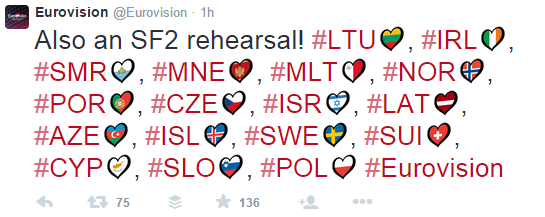 It's great to see Eurovision embracing social media and we can only expect this interaction to grow.
It's great to see Eurovision embracing social media and we can only expect this interaction to grow.
